#Neo Edmund
Explore tagged Tumblr posts
Text
in Archie Silver returns to his same life in the future with a new history he has relearn every time he goes back in time. one time he came back and Edmund tells him how he beat a plant monster in his new past



is that how it works for canon Silver? that’s how it works for Eggman Neo (we’re calling him that) because his whole deal is that he hates Eggman for ruining his reputation in the future so is that how it works for Silver too? imagine Silver comes back to the future and suddenly finds that he has a boyfriend he’s dated for years that didn’t even exist in the last timeline
#sonic the hedgehog#silver the hedgehog#mammoth mogul#edmund#eggman neo#archie sonic#sonic rivals#archiesilver and friends series#i guess
26 notes
·
View notes
Text
youtube
Wait by NAO - Director: Lisette Donkersloot
#music#nao#grades#daniel traynor#loxe#rowan perkins#neo jessica joshua#andrew vickery#nicola sipprell#music video#video#lisette donkersloot#aaron reid#ash halliburton#dave warren#ramario chevoy#martin goodwin#mata marielle#maya scarlette#edmund bossman#Youtube#SoundCloud
32 notes
·
View notes
Text



𝚈𝚘𝚞 𝚊𝚛𝚎 𝚝𝚑𝚎 𝚁𝚘𝚊𝚍 🧭
𝚂𝚞𝚛𝚛𝚘𝚞𝚗𝚍 𝚢𝚘𝚞𝚛𝚜𝚎𝚕𝚏 𝚠𝚒𝚝𝚑 𝚝𝚑𝚎 𝚍𝚛𝚎𝚊𝚖𝚎𝚛𝚜, 𝚊𝚗𝚍 𝚝𝚑𝚎 𝚍𝚘𝚎𝚛𝚜, 𝚝𝚑𝚎 𝚋𝚎𝚕𝚒𝚎𝚟𝚎𝚛𝚜, 𝚊𝚗𝚍 𝚝𝚑𝚒𝚗𝚔𝚎𝚛𝚜, 𝚋𝚞𝚝 𝚖𝚘𝚜𝚝 𝚘𝚏 𝚊𝚕𝚕, 𝚜𝚞𝚛𝚛𝚘𝚞𝚗𝚍 𝚢𝚘𝚞𝚛𝚜𝚎𝚕𝚏 𝚠𝚒𝚝𝚑 𝚝𝚑𝚘𝚜𝚎 𝚠𝚑𝚘 𝚜𝚎𝚎 𝚝𝚑𝚎 𝚐𝚛𝚎𝚊𝚝𝚗𝚎𝚜𝚜 𝚠𝚒𝚝𝚑𝚒𝚗 𝚢𝚘𝚞, 𝚎𝚟𝚎𝚗 𝚠𝚑𝚎𝚗 𝚢𝚘𝚞 𝚍𝚘𝚗’𝚝 𝚜𝚎𝚎 𝚒𝚝 𝚢𝚘𝚞𝚛𝚜𝚎𝚕𝚏. -𝙴𝚍𝚖𝚞𝚗𝚍 𝙻𝚎𝚎
𝙺𝚒𝚜𝚜𝚎𝚜 𝙵𝚘𝚛 𝚁𝚘𝚜𝚎𝚜 𝚋𝚢 𝙰𝚛𝚝 𝙳𝚎𝚙𝚊𝚛𝚝𝚖𝚎𝚗𝚝, 𝙰𝚚𝚞𝚊𝚛𝚒𝚞𝚜 𝙷𝚎𝚊𝚟𝚎𝚗

#x-heesy#my art#artists on tumblr#2/2024#knowledge#wisdom#Edmund Lee#You are the road#mental health#you are loved#you are not alone#quote#quotes#quote inspiration#qotd#artful quotes#text art#typography#pop art#neo pop art#iphone art#fucking favorite#now playing#music and art#contemporaryart#l o v e
10 notes
·
View notes
Text
Germanic Paganism Resource Masterlist
Notes: - Updates will be beyond infrequent. - Feel free to pop into my ask box requesting resource recommendations at any moment. - Resources do not reflect my personal beliefs or practice. I may include otherwise great resources that include theories and ideologies I do not support (such as the 'sign of the Hammer'), because I make extensive use of cross-referencing, reflection, etc to determine everything I incorporate into my craft. - I will never consciously add resources written by (Neo-)Nazis and the like. If you spot them, feel free to let me know. - You may notice there is a seemingly disproportionate amount of sources also or primarily talking about Scandinavia and Iceland, and even some primarily covering England. This is because continental Germanic paganism has only barely survived the ravages of time, and one can only learn about it if they supplement their knowledge with the more complete pictures of Anglo-Saxon paganism and Norse paganism.
Legend: [No language identifier means the source is English.] [D] - The resource is written (primarily) in Dutch. [G] - The resource is written (primarily) in German. [ON] - The resource is written (primarily) in Old Norse. [OD] - The resource is written (primarily) in Old Dutch. [OG] - The resource is written (primarily) in Old High German. [L] - The resource is written (primarily) in Latin. [F] - The resource is written (primarily) in French. * - I have not read the resource in its entirety. ** - Read with caution. !! - There is more of the resource available/this is one part of multiple.
Historic Texts and References
Tacitus' Agricola and Germania
Tacitus' Annals
The Prose Edda
The Poetic Edda
The First Nine Books of the Danish History of Saxo Grammaticus
Contemporary Books, Essays, Other Media
Myths and symbols in pagan Europe : early Scandinavian and Celtic religions - H.R. Ellis Davidson
Kleinere Altniederdeutsche Denkmälen - Heyne [G]*
Religion and Philosophy in Germany : a Fragment - Heine *
Deutsche Volkskunde - Adolf Bach [G]*
Teutonic Mythology - Grimm
Swedish Legends and Folk Tales - John Lindow
Scandinavian Mythology : an Annotated Bibliography - John Lindow *
Trolls : an Unnatural History - John Lindow
Myths of the Norsemen from the Eddas and Sagas - H.A. Guerber
Northern mythology : comprising the principal popular traditions and superstitions of Scandinavia, North Germany, and The Netherlands - Benjamin Thorpe | VOL 1, VOL 2, VOL 3
From Myth to Fiction : the Saga of Hadingus - Georges Dumézil *
The Stakes of the Warrior - Georges Dumézil **
Gods of the Ancient Norsemen - Georges Dumézil **
Zum Tamfana-Rätsel - Edmund Weber [G]*
De Tijdstippen van de Cultische Jaarfeesten - Boppo Grimmsma [D]**
Nederlansche Volksoverleveringen en Godenleer - Van den Bergh [D, OD]*
Tales and Legends of Tyrol *
Germanic Spirituality - Bil Linzie
Handwörterbuch des Deutschen Auberglaubens - Baechtold-Staubl, Hoffman-Krayer
Goden van de Lage Landen - Gunivortus Goos [D]**
Runic and Heroic Poems of the Old Teutonic Peoples - Dickins *
Gods and Myths of Northern Europe - H.R. Ellis Davidson
Old Norse - Icelandic Literature : a Critical Guide - John Lindow
Vikings : a Very Short Introduction - Richards *
Norse Mythology : a Guide to the Gods, Heroes, Rituals and Beliefs - John Lindow
Antwoord op de Vraag, door het Zeeuwse Genootschap de Wetenschappen - te Water [D]*
Verhandelingen over het Westland, ter opheldering der Loo-en, Woerden en Hoven, benevens de natuurdienst der Batavieren en Friezen - Buddingh [D]*
De Goden der Germanen - de Vries [D]*
Norse Revival: Transformations of Germanic Neopaganism - Stefanie von Schnurbein (in the series Studies in Critical Research on Religion which I highly recommend)
Digital Libraries, Dictionaries and the Like
Digitale Bibliotheek voor Nederlandse Letteren [D]*
Digitised Collection of Historic Sources of the WWU in Münster [G, D, OD, OG]*
Oudnederlands Woordenboek [D, OD]*
Ons volksleven : tijdschrift voor taal-, volks- en oudheidkunde. Jaargang 2-12 [D]*
Het Rad - Digitale Bibliotheek voor Germaans Heidendom, Runen, Seidr [D]*
Volkskunde (search results on Delpher) [D]*
Goden van Eigen Bodem - Digitale bibliotheek voor heidens erfgoed van de lage landen [D]*
Godinnen van Nederland en België [D]**!!
Forgotten Gods - Reginheim **
The Rune Poems *
Kronieken van de Westhoek (Flemish Folk History) [D]*
Brabantse Folklore, bulletin van de provinciale dienst voor geschiedkundige en folkloristische opzoekingen [D]*
Project Gutenberg has a wealth of resources about pre-christian Germanic religion*
Mimisbrunnr.info has a wealth of information including starter guides.
Author Recommendations
J.R.W. Sinninghe [D]
John Lindow
Benjamin Thorpe
H.R. Ellis Davidson
The Grimm Brothers
J. Haver [D]
To be continued.
69 notes
·
View notes
Text
David Badash at NCRM:
U.S. Senator Josh Hawley (R-MO) declared Monday he is advocating for Christian nationalism, a far-right ideology that claims there is no separation of church and state in the Constitution, and promotes as a national religion Christian fundamentalism, a hardline, extremist brand of Christianity at odds with the religious beliefs of many Christians across the country. It opposes LGBTQ people and people of other faiths or of no faith, and their civil rights. It often has links to neo-Nazis, white supremacy, and dominionism, and many see Russia and Russia’s president, Vladimir Putin, as its leader.
“Some will say I’m calling America a Christian nation. And so I am. Some will say I’m advocating Christian nationalism. And so I do. My question is – is there any other kind worth having?” Senator Hawley said at “NatCon 4,” the National Conservatism conference being held in Washington, D.C., this week (video below), as reported by Semafor’s David Weigel.
Sen. Hawley, not backing down, promoted his remarks by reposting them on social media. Senator Hawley told attendees at the far-right conference, “Christian nationalism founded American democracy.. the Christian political tradition is our political tradition,” Weigel also reported. “They want the religion of the pride flag. We want the religion of the Bible. I have a suggestion: Why don’t we take down the trans flag from all the federal buildings from which it’s flying, and instead, inscribe on every federal building our national motto: In God We Trust?” Hawley also reportedly said. [...] National Conservatism is a multinational “project” created by the Edmund Burke Foundation, a Netherlands-based group.
Senator Josh Hawley (R-MO) spoke at NatCon recently and declared that he is “advocating Christian nationalism”. Hawley pushed the lie that “Christian nationalism founded American democracy.”
53 notes
·
View notes
Note
what echidnas were left after Thrash in universe? also where did he send them?
Echidnas left who were from Mobius Prime:
Knuckles Dimitri Dr. Finitevus Aurora and Athair (Neo Walkers) The ghosts of the deceased Brotherhood members Edmund the 2nd (Silver's time) Mari-An and Jon (in hiding from Lord Hood)
As for where he sent them? It's not explicitly stated but seeing as he looked through Finitevus' notes, he probably sent them to the Twilight Zone/Cage where the remainder of the Brotherhood and Moritori Rex were stuck.
8 notes
·
View notes
Text
By Kevin Finn
I have a Notepad file called “Lies Democrats Believe.” It’s a compilation of lies told by leftist politicians, bureaucrats, and talking heads in the Democrat Media Industrial Complex (DMIC).
Why do Democrats lie? I don’t think they have any choice. The policies of the left are so damaging that those who promulgate them are averse to speaking of them openly. Can you imagine if they did? “Hey! We plan on keeping the border wide open so that those 435,000 convicted criminals we’ve let in over the course of the last few years will be just the tip of the iceberg! And we want to force you to sell your gasoline-powered car and go into hock for an E.V. you can’t afford and don’t want. We’re going to tax unrealized capital gains and probably collapse the stock market, convince your 6-year-old son to chemically sterilize himself, and force your daughter to share locker rooms with boys in her high school! How’s that sound?”
Some of these lies were quickly debunked, such as “Hillary Clinton was named after Sir Edmund Hillary.” Others, such as “Hunter Biden’s laptop had all the earmarks of Russian disinformation,” have likely changed the course of American history. Some are rather quickly forgotten, like “Nicholas Sandmann mocked a Native American elder,” whereas others, like “Trump called neo-Nazi’s very fine people,” seem to take on a life of their own even after being repeatedly debunked even by the DMIC. These falsehoods are all part of a well coordinated propaganda campaign being waged on the American people by the left.
In what I consider some of the most valuable 13 minutes on YouTube, the video of a 1984 interview with Soviet defector Yuri Bezmenov describes the program of Marxist ideological subversion. There are four steps: Demoralization (Indoctrination), Destabilization, Crisis, and Normalization. Here’s a transcript.
2 notes
·
View notes
Text
Professor Kirke remained at the small dining table after the last of the dishes had been cleared away, puffing clouds on his pipe. It was strange, thought Lucy: he had a faraway look in his eyes, as though some tiny aspect of his reality had shifted over dinner and he was struggling to accommodate it.
“I wonder what he’s thinking about,” murmured Lucy to the others. Edmund shrugged and Eustace (who had only met the professor that night) said nothing, but Peter chuckled merrily and patted Lucy on the arm.
“You’ll find out soon enough, that’s certain. He got that look in his eye when you were talking about the Island of Dreams, Lu. No doubt he’ll call you into his study for a lesson later on.”
It was a little more than a week later that Peter’s prediction came true. Professor Kirke seated himself across his desk from Lucy with an enormous tome of poetry spread out before him. “Have you heard The Rime of the Ancient Mariner?” he inquired.
Lucy shook her head. Yet rather than muttering about the state of the schools as she had expected, Professor Kirke simply smiled beneath his whiskers and began to declaim:
“It is an ancient Mariner /And he stoppeth one of three —"
Lucy leaned back in her seat and fixed her attention on the words as best she could. Once, she’d spoken in such a register as queen of Narnia, but now she was only a girl of ten and unaccustomed to the flowery language of Romantic poetry.
“At length did cross an Albatross,
Thorough the fog it came—”
“Oh!” cried Lucy. “Is that why you wanted me to hear this poem?”
“Just so,” the professor replied. “Your account of the Island where Dreams Come True bears a marked resemblance to The Rime, beginning with the presence of the albatross. In this poem, the albatross bears a symbolic connection to Jesus Christ himself.”
“How peculiar!”
“I thought so too. Samuel Taylor Coleridge wrote this poem in 1797, in a time when sea voyages to the polar regions were very much like your own voyage to the end of the world. The albatross had only lately been described in writing, but he wrote it coming out of the desolate fog to guide sailors to safety. And Coleridge was a neo-Platonist! Fog and ice are very much like darkness, the way he uses them here.”
“A neo-Platonist?” Lucy asked, wrinkling her nose.
And now came the Professor’s customary muttering. “Yes. What do they teach in these schools? You may read darkness and fog both in Coleridge as something between ignorance and innocence, with the Sun as a symbol of Reason. Does that make sense?”
“A little,” said Lucy, who privately didn’t think it made much sense at all but was eager for the professor to continue the poem.
“It ate the food it ne'er had eat,
And round and round it flew.
The ice did split with a thunder-fit;
The helmsman steered us through!”
Lucy hadn’t meant to interrupt again so soon, but the words were out of her mouth before she was really aware that she’d spoken them. “So it really is just like in Narnia! It guides the ship out of the ice like my Albatross guided us out of the darkness.”
“Yes.” Professor Kirke was entirely unperturbed by the interruption. “Precisely.”
“How lovely. Isn’t it interesting how you just know when birds are trustworthy?”
The professor chuckled. “You may change your mind in a few stanzas. Shall I go on?”
“Please.”
Lucy returned to her concentration as the mariner recounted how a good wind had sprung up after the Albatross and how it had stayed with the ship and perched on the mast sometimes for evening prayers. Yet the mariner must have looked unhappy, for the groom interrupted to ask him why.
“With my cross-bow/ I shot the albatross.” Professor Kirke paused here in his telling and looked very hard at Lucy.
It took her a long moment to understand. “The albatross isn’t dead, is he?”
“He is.”
“I thought you said he was like Aslan.”
“And didn’t you see Aslan die?”
Lucy opened her mouth, but closed it a moment later. Open again, “But why did the mariner kill him? Doesn’t he give any reason? The witch killed Aslan because she was evil and trying to conquer Narnia. Why would the mariner kill the albatross when it’s done nothing but help him?”
“Perhaps,” the professor replied, “the Gospels are a simpler comparison here. ‘I shot the albatross’ has the same kind of blunt irrefutability as ‘And they crucified him.’ There isn’t any excuse, which I think makes the confession all the more powerful.”
Lucy sighed. It was exhausting trying to keep this all straight. “I suppose that makes a kind of sense. But then we’re trying to think on three different levels of parallel—the poem, the Bible and Narnia—which isn’t very pleasant.”
“And yet, it’s necessary if one wishes to understand deeper meanings. We can pause for tea, if you’d like?”
“No, that’s alright. I think I’m keeping track well enough for now. I say though, is this what you do with Peter all day?”
The question seemed to catch Professor Kirke off guard, for he let out a sudden, loud burst of laughter as soon as Lucy asked it. “Yes, after a manner of speaking. Shall we go on?”
“Ah! well a-day! what evil looks
Had I from old and young!
Instead of the cross, the Albatross
About my neck was hung.”
It was a difficult thing to imagine and Lucy wondered if Aslan’s albatross was unusually large. Aslan was always bigger than she expected him to be, so it would not be strange if he took the form of an unusually large albatross. Yet the more Lucy considered, the more sense the image made.
“It must have been at least three meters,” said Lucy. “The albatross, I mean. Mine was more like four, from wingtip to wingtip. It would be a dreadful weight, but I suppose that’s the point. The mariner can’t carry it, can he?”
“I think you’re right,” said Professor Kirke.
A smile tugged at Lucy’s cheeks. It was lovely to hear the professor give such an unequivocal endorsement of her analysis. Galvanized by the success, she continued, “I thought of a cross when my albatross appeared out of the darkness. There’s something in the proportion of the body to the wings, and in its stillness of it as it glides through the air. My albatross tore away the darkness. But here—it’s like the mariner carries his albatross like he thinks that act can save him from what he’s done.”
There was a glittering in the old professor’s eyes then, and suddenly Lucy realized that she wasn’t struggling with the poem’s language anymore. Maybe it was because she’d been listening to it for the better part of ten minutes, but privately she wondered if Narnia’s magic might be working on her somehow. Perhaps this poem contained some quality of the rich Narnian air.
“I looked to heaven, and tried to pray;
But or ever a prayer had gusht,
A wicked whisper came, and made
My heart as dry as dust.”
Lucy shut her eyes and remembered the fighting-top of the Dawn Treader. The night-mare life-in-death was a black abyss, and all her own nightmares had been there in it. There had been monsters, of course, and the idea that even if she ran down to stand beside Edmund he might become a monster himself. But somewhere in all that dark, there was a Lucy who never spoke to Aslan again. She’d imagined herself in Lord Rhoop’s place, trapped forever in a state of endless fear-without-courage, because she could not call him.
“That was my night-mare too,” she whispered. “Not being able to pray.”
She saw the professor’s lips thin beneath his whiskers and wondered at it. “You’re wiser than you have any right to be,” he murmured. “Ten years old and your greatest nightmare is alienation from God. What a marvel you’ll be when you’re grown.”
Well then. Lucy didn’t have any notion what to say to that. She half expected that if she tried to reply, she might start crying.
“Might I ask—what did you do then? Until the albatross arrived, once you realized that you couldn’t pray. How did you react?”
And that was a question she could answer.
“But I could pray! I did. I whispered, ‘Aslan, if you ever loved us at all, send us help now.’ And that was when the albatross came. I didn’t talk about it after—it was too much my own for me to share it, really—Edmund knows—but well…”
The professor made a sort of choked noise in his throat. “Perhaps it was the only nightmare that the island couldn’t bring true.”
“But there have been times,” continued Lucy, “when my heart was too dry to speak with Aslan. There were whole years when I was queen that he didn’t come at all.”
It was with a much softer voice that Professor Kirke resumed his reading.
“A spring of love gushed from my heart,
And I blessed them unaware:
Sure my kind saint took pity on me,
And I blessed them unaware.
The self-same moment I could pray;
And from my neck so free
The Albatross fell off, and sank
Like lead into the sea.”
Here, the professor lapsed into silence. Lucy thought that the poem might be over, but when she peered across the desk at the page there were columns of stanzas still left.
“Even after all these years,” he whispered, “some things still remind me of my own days in Narnia.”
He’d told the children his story before, of course: beginning with how he met Aunt Polly and concluding with the origins of the wardrobe. Aslan had not condemned him for bringing the White Witch to Narnia. Instead, he’d had loved Digory enough to shed tears and sent him home with an apple so beautiful that it healed his dying mother.
“Grace,” Lucy whispered into the hush. “Of course. Maybe this is the moment where Aslan leads the mariner out of the darkness.”
Professor Kirke exhaled heavily. The faraway look in his eye lessened a little bit, and at length he read on.
“The spirit slid: and it was he
That made the ship to go.”
Never had Lucy felt Aslan’s presence more keenly in his absence than during those last days as the Dawn Treader had sailed over the still, clear waters at world’s end; like Aslan himself had been drawing them towards himself by some great, invisible rope.
The closer they’d come to his country, the more tangible his spirit had been. When at last she glimpsed those green mountains beyond the waves, Lucy’s very bones understood that Aslan had made the still seas bring them there.
A voice spoke out of the air concerning the mariner, and Lucy remembered the piercing silence of the Last Sea. Of the voice, the mariner said, “He loved the bird that loved the man/ Who shot him with his bow.”
Not for the first time, Lucy wondered about Aslan’s father, the Emperor-beyond-the-Sea. What did he say to Aslan when he left that land of high mountains to return to Narnia and die at the Witch’s hand? What did he think when Aslan went flying across the lily-covered seas on feathered wings to rescue their little ship? If Lucy had crossed that final threshold with Reepicheep, would she have met the Emperor there?
“The voice is his father,” Lucy said, voice brimming with certainty. “The albatross’s father, I mean. The Emperor-beyond-the-Sea.”
“I know,” the professor replied. “And beyond the sea is just where our mariner meets him.”
“Do you think the mariner knew that the albatross loved him?”
The professor stroked his chin again, and a ghost of a smile played across his features. “If the mariner didn’t know it when he shot him, he certainly knows now. But come, we’re nearly at the end of the poem.
“Swiftly, swiftly flew the ship,
Yet she sailed softly too:
Sweetly, sweetly blew the breeze—
On me alone it blew.
Oh! dream of joy! is this indeed
The light-house top I see?”
“There’s one more thing I haven’t told you,” Lucy said. “Something so bright and mysterious that I’ve not even told Edmund. When the albatross came, it—it spoke to me. And I wasn’t afraid anymore.”
Professor Kirke leaned forward, but his words were, “You needn’t tell me what he said if you’d prefer not to.”
Lucy nodded slowly. Somehow, she knew that if she tried to describe “Courage, dear heart,” she would fail. There was nothing, no word or image or music or poetry in this world or any other that could convey what that moment had been. To speak of it at all would be like dancing about architecture.
“I was the only one who heard him,” Lucy whispered. “It was my prayer, and he spoke to me. I wonder how this poet knows what it was like?”
“I think he knows the same way I do, in my own way. Coleridge lived a difficult life. He was a laudanum addict when he wrote this, for one thing. When the Divine voice speaks into our darkness and we feel his breath on our faces, it binds us together with every other person who has ever been rescued by an albatross that loved us. We don’t know what he says to other people, but we know how the breeze feels.”
The professor returned to his reading and concluded the poem while Lucy sat in astonishment and let the strangeness of the last hour wash over her.
“…A sadder and a wiser man/ He rose the morrow morn,” and with those words Professor Kirke shut the book. The heavy pages fell with a thud, and with bright eyes he looked at Lucy. “What do you think of it?”
“I think,” said Lucy slowly, “that it was a beautiful story. The very best kind.”
What she did not say, but what she was thinking, was that it reminded her of the story she’d read in the Magician’s book: the one about the cup, the sword, the tree, and the green hill. The two tales had no common points of reference, but they left her with much the same feeling.
“But why do you think Aslan came to me as an albatross?”
Professor Kirke harrumphed. “I have been asking myself that same question ever since you spoke of it. Why indeed? I wonder whether perhaps in part he appeared that way so that you would come back here and read ‘The Rime of the Ancient Mariner,’ and come to know him better by it. If nothing else, I do not think it was a coincidence.”
Yes, perhaps, but the answer still felt incomplete. “Maybe it’s a stone in the bridge he talked about,” Lucy said. “Maybe he only wanted to show me—to show us—that he’s here too. In this world, in this time, and in all others. Maybe it’s like you said, and there’s an albatross for every person who’s ever been rescued from the darkness.”
#i have wanted to write something like this for a loooooong time#but kinda felt like i wasn't up for the challenge#i'm off for a few days so i finally got it in 'good enough' shape though i'm far from being totally happy with it#hopefully it will make sense to people who haven't read The Rime#though it was written with an assumption that at least some cultural osmosis will have gotten to folks#i go absolutely crazy for the way that Jack incorporated the albatross from Rime into VDT#it is so darn elegant#he both upholds and subverts the symbolism of the original#i love love love love it#and i wish someone would assign me like an actual academic essay on the topic#in the meantime we'll have to get by with literary analysis just barely couched in narrative#dear darling heart-daughter of aslan#the magician's nephew no longer#into light#(courage dear heart)#narnia#leah stories#pontifications and creations#also! i just cross-posted to ao3 if you'd rather read this there#i know it got pretty long#(and i skimmed over a LOT)#intertextuality#characters within a work notice the intertextuality#if this makes your brain hurt a little bit i think i did my job right
36 notes
·
View notes
Text
DEAR YULETIDE WRITER LETTER 2023
IT’S A YULETIDE LETTER. IT’S YULETIDE 2023, BAYBEEE. LET’S FUCKING GO.
2008. 2009. 2010. 2011. 2012. 2013. 2014. 2015. 2016. 2017. 2018. 2019.
HIIII. I LOVE YOU. THANK YOU. It’s yuletide; it’s the best time of the year. I’ve been gone for a minute but I’m back, baybeee, back with the matrix fandom amongst others. So let’s fucking go! Thank you thank you and thank you.
Likes (generally): I love kisses and angst and smut and darkfic and tension and hurt/comfort and a good adventure and heroism and sacrifice. I love every flavor of sexuality. I love women in dominant roles (including but not limited to domme). I prefer fics in canon or canon divergence. I enjoy the following kinks: enemies to lovers, sex pollen/fuck or die, Stockholm syndrome, voyeurism, fingering, conditioning. Dubcon and non-con and dead dove is always welcome (pls tag it).
Dislikes (generally): Watersports, scat; omegaverse; mpreg/pregnancy/breeding; submissive female characters; domestic fluff; kid fic and curtains; mundane AUs; super sugar ending; hurt no/comfort or utter hopelessness or despair as the final beat of the story (beloved in the opening or middle of a story!)
It’s Yuletide, baybeee, so if you want to write any of these prompts fully gen: I’m so happy to read it!!
THE PROMPTS!!!!!!!!!!!!!!!!!!!!
The Matrix (Movies)
Trinity
If you could please write me a character study of Trinity; dig deep into the character and show me something vulnerable and new and wonderful about her.
My favorite things about Trinity: she is powerful, vulnerable, steadfast, competent, anxious, loyal, brave, and a twinge of cunt. She’s my favorite character ever; a touchstone, a rock, an icon. Tell me a story about Trinity.
If the muse strikes, feel free to ship her with Neo, Ghost, Switch, Bane, or Groff!Smith.
Very emotional that The Matrix is a YT fandom for perhaps one reprise since ffn.net fics were thrown out re: eligibility. I’m a historied Matrix fandom old; this is bittersweet to be eligible again perhaps one last time. Hi, I love you, Matrix fandom <3
The Wheel of Time (TV)
Lanfear
If you could please write me a character study of Lanfear; dig deep into the character and show me something vulnerable and new and wonderful about her.
My favorite things about Lanfear: she is powerful, vulnerable, terrifying, terrible, cruel, full of desire, and that she’s a complete cunt. She makes my heart flutter. Tell me a story about Lanfear.
If the muse strikes, feel free to ship her with Lews, Rand, Moiraine, Moggy, or Ishamael. I don’t mind book spoilers!
The Lord of the Rings: The Rings of Power (TV 2022)
Galadriel | Artanis
If you could please write me a character study of Galadriel; dig deep into the character and show me something vulnerable and new and wonderful about her.
My favorite things about Galadriel: she is powerful, vulnerable, terrifying, terrible, kind, and sometimes a bit cunt. She’s the dom femme of my life currently. Tell me a story about Galadriel.
If the muse strikes, feel free to ship her with Sauron, Gandalf, or Celeborn.
IDK how TROP was eligible this year, but LFG.
Chronicles of Narnia (Movies)
Edmund Pevensie
Lucy Pevensie
Bless my problematic heart but I really want an Edmund/Lucy fic, like. In that way. Any canon era (I am partial to HHB).
If that’s too rich for your blood, forgive me, and write me a non ship duet about them. I WILL LOVE ANY FIC WITH THEM CODEPENDENT.
My favorite things about them together is that they are complementary; he is tainted and a spymaster and Jadis marked him, she is blessed and valiant and Aslan marked her. Tell me a story about Edmund and Lucy Pevensie.
If the muse strikes, and you need alt ships: throw in Caspian for either, and I have a soft spot for Lucy/Tumnus or Lucy/any woman. Edmund/Jadis is my true love.
A bit emotional that Narnia films are a YT fandom for perhaps one reprise since ffn.net fics were thrown out re: eligibility. LFG.
Willow (TV 2022)
Elora Danan
Jade Claymore
Kit Tanthalos
I am desperate to see Jade evolving into Elora’s General Kael; a glorious mirror of her father as a warrior, a leader, and an absolute terror.
Background (or foreground) Jade/Kit is wonderful, and mixing Elora in there is great if you enjoy that too! My favorite thing about Jade Claymore is that she’s surprise the new General Kael and I’m so obsessed with that concept.
Dune (2021)
Duncan Idaho
Paul Atreides
Bless my problematic heart but I really want an Duncan/Paul fic, like. In that way.
My preference is for the film character dynamic transposed into a book spoiler (so if you know it - that’s my dream; I’d love to see that), and I would also love something messy in current film canon.
If that’s too rich for your blood, forgive me, and write me a non ship duet about them. I WILL LOVE ANY FIC WITH THEM CODEPENDENT. My favorite things about them together is that Duncan is so loyal (and for what?) and Paul is so needy for that loyalty (and soon, for what?).
If the muse strikes, and you need alt ships: I also adore me some Duncan/Leto and Paul/Chani.
//
Xoxoxo love you forever!
#yuletide 2023#the finals you sign up for#emotional about the matrix being eligible again#(also narnia)#my favorite thing about my yt history is how i started anti mlm and anti noncon#growth dot gif
4 notes
·
View notes
Note
🤍 - What would your character be like if they were a hero of a region?
[@pkmn-aide-mel]
//ooh, this is a fun one!
//see, the thing is snow was a hero, so this is less of an "if" and more of an opportunity for me to drop some lore. i've thought about making a fangame about this, actually, and i might do it at some point. name's already decided: pokemon genesis.
//in 2015, when snow was 10 years old, several members of neo plasma gathered again under colress, hoping to bring their team back to the prominence it once had. just general criminal activity at first, enough to give the group a source of income, but they knew from the beginning that they'd need to manage something big if they wanted to have a place in the world again.
//meanwhile, snow and its rival were both given formerly wild cubchoo who'd been directly affected by habitat loss by a galarian man named edmund caulfield, who also provided the necessary funds and supplies for them to be able to travel, with a promise to give any other support needed along the way as well (snow and its rival both got their passion about ice type conservation from talking to him). it wasn't just the two of them -- there were several other kids their age who also weren't in a position where they would be able to go on a journey without support -- but the other children aren't really important to this story.
//some time into snow's journey, the revived neo plasma stole a dwebble from a girl named flora. she asked snow for help getting it back, and a few battles later she and her pokemon were reunited. flora hadn't seen much reason to travel herself before that, but when snow returned with her dwebble she very suddenly thought snow was very strong and cool and wished she was that strong and cool and maybe going with snow would let her get stronger? and obviously there was no other reason that she really wanted to be with snow more.
//yes, they ended up dating. feel free to poke snow about its history there.
//snow helped a few other people with plasma problems along the way, and eventually it found something in one of the storehouses it broke into: a paper document outlining something called project regenesis.
//in short: plasma was trying to track down something they'd made in their previous incarnation. a pokemon. a living weapon. they had a device for the purpose, and were slowly closing in on its location.
//that's when snow started actively trying to seek them out in order to get in their way. it was in serious danger at multiple points, but it managed to avoid getting any injuries bad enough that it had to go to a hospital and couldn't just get help from a pokemon center's urgent care.
//and eventually, it managed to defeat colress in battle and destroy the device, allowing genesect to disappear once more.
//it got some recognition for its efforts, but not as much as the game protags get, since the situation was solved before any legendaries made actual appearances.
3 notes
·
View notes
Text
Sploosh-o-matic — Minimum Range Morton
Neo Sploosh-o-matic — I’ll Be Over Here Harold
Splattershot Jr. — Chuck Bomb Billy
Custom Splattershot Jr. — Dance for Me Dylan
Splash-o-matic — Do It All Dan
Neo Splash-o-matic — Please Step Away Sandy
Splattershot — Basics Barry
Tentatek Splattershot — Aggression Andy
Hero Shot Replica — Hipster Harry
.52 Gal — Staying Power Segal
N-Zap ‘85 — Gamer Juice Jerry
N-Zap ‘89 — Chump Up Chazz
Splattershot Pro — Extension Edmund
Forge Splattershot Pro — Lockout Larry
.96 Gal — Power Suck Pete
.96 Gal Deco — Intimidating Ingo
Jet Squelcher — Respectfully Far Ferdinand
Custom Jet Squelcher — Area Denial Alfred
Splattershot Nova — I See You Stanley
Annaki Splattershot Nova — Out of Reach Otto
Luna Blaster — Big Boom Bolson
Luna Blaster Neo — Poppin’ Boppin’ Pablo
Blaster — Sneaky Shot Shane
Range Blaster — Sudden Death Dalton
Clash Blaster — Danger Zone Zed
Clash Blaster Neo — Personal Space Piper
Rapid Blaster — Hold the Line Herbie
Rapid Blaster Deco — Weird Angle Wilson
Rapid Blaster Pro — Distant Poke Perry
Rapid Blaster Pro Deco — Global Range Gus
S-BLAST ‘92 — Certain Coverage Calvin
L-3 Nozzlenose — Run ‘n Gun Randy
L-3 Nozzlenose D — Dash ‘n Splash Sadie
H-3 Nozzlenose — Field Support Franky
H-3 Nozzlenose D — Defense Mode Dimitri
Squeezer — Arthritis Angelo
Carbon Roller — Close Range Cory
Carbon Roller Deco — Quick Kill Kendall
Splat Roller — Bonk Head Bekowsky
Krak-On Splat Roller — Shuffle Around Sidney
Dynamo Roller — Massive Maximilian
Flingza Roller — Passive Aggressive Paulie
Big Swig Roller — This is My Yard Yorick
Big Swig Roller Express — I Claim This Cortes
Inkbrush — Speedy Sal
Inkbrush Nouveau — Can’t Catch Me Cooper
Octobrush — Slap Silly Solomon
Painbrush — High Exertion Edison
Classic Squiffer — Don’t Miss Dorris
Splat Charger — Sniper Stu
Z+F Splat Charger — Snipe Stopper Stuart
Splatterscope — Scoped Sniper Stu
Z+F Splatterscope — Scoped Snipe Stopper Stuart
E-liter 4K — Long Snipe Louis
E-liter 4K Scope — Scoped Slightly Longer Snipe Louis
Bamboozler 14 Mk I — Tap Tap Ted
Goo Tuber — Missiles McGee
Snipewriter 5H — Five Tries Freddy
Slosher — Over the Shoulder Oakley
Slosher Deco — Plop Plip Peter
Tri-Slosher — Wide Wendell
Tri-Slosher Nouveau — Sugar Rush Rudy
Sloshing Machine — Safe Angle Abigail
Bloblobber — Hitbox Huey
Explosher — Clear Out Clarence
Mini Splatling — Pesky Pendleton
Zink Mini Splatling — Bridge Troll Bailey
Heavy Splatling — Barrage Benson
Heavy Splatling Deco — Thought Ya Had Me Theo
Hydra Splatling — Extreme Overkill Olson
Ballpoint Splatling — All Range Albus
Nautilus 47 — Decently Devious Devon
Dapple Dualies — Hello I’m Back Harlowe
Dapple Dualies Nouveau — I May Die Decker
Splat Dualies — Missed Me Maxwell
Glooga Dualies — Wall Turret Terry
Dualie Squelchers — Right Behind You Benjamin
Custom Dualie Squelchers — Reinforcement Ralphie
Dark Tetra Dualies — Distraction Dance Doyle
Light Tetra Dualies — Look at Me Lenny
Splat Brella — Survivor Simon
Tenta Brella — Mobile Bunker Bastian
Tenta Sorella Brella — Army March Muldoon
Undercover Brella — Slippery Saul
Tri-Stringer — Chip Away Chet
REEF-LUX 450 — Sky Assault Stevie
Splatana Stamper — Jumbo Cut Jayce
Splatana Wiper — Slice and Die Samuel
Splatana Wiper Deco — Heavenly Hello Hamish
6 notes
·
View notes
Text
Top 10 Horror Noir Movies

Horror noir is a captivating genre that intertwines the suspenseful elements of film noir with the chilling aspects of horror. Here are ten essential films that exemplify this unique blend:
Nightmare Alley (1947) Directed by Edmund Goulding and based on William Lindsay Gresham's novel, this film follows a manipulative carnival barker who becomes entangled with a dangerous psychiatrist. Its dark, psychological themes and moral ambiguity make it a quintessential horror noir.
Psycho (1960) Alfred Hitchcock's groundbreaking film blends horror and noir through its tale of Norman Bates, a disturbed motel owner. The film's exploration of identity and madness, along with its iconic shower scene, has cemented its status as a classic in both genres.
The Night of the Hunter (1955) Charles Laughton's only directorial effort features Robert Mitchum as a sinister preacher who marries a widow to find her deceased husband's hidden money. The film's stark visual style and haunting narrative create an unsettling atmosphere that is both noir and horror.
Angel Heart (1987) This neo-noir film stars Mickey Rourke as a private investigator drawn into a web of murder and occultism while searching for a missing singer in New Orleans. Its blend of hard-boiled detective work and supernatural horror makes it a standout in the genre.
Se7en (1995) Directed by David Fincher, this film follows two detectives hunting a serial killer who uses the seven deadly sins as his modus operandi. The grim atmosphere and psychological horror elements contribute to its classification as a horror noir classic-
Diabolique (1955) A French thriller directed by Henri-Georges Clouzot, this film revolves around two women plotting to murder an abusive husband. It starts as hardboiled noir before transitioning into psychological horror, culminating in shocking twists that have influenced many subsequent films[4][1].
Cape Fear (1962) In this neo-noir thriller, Robert Mitchum plays Max Cady, a vengeful ex-convict stalking the lawyer who testified against him. The film's intense psychological tension and themes of revenge elevate it to horror noir status.
The Seventh Victim (1943) Produced by Val Lewton, this film follows a young woman searching for her missing sister, leading her into the dark world of a Satanic cult. Its slow-building dread and exploration of existential themes make it an early example of horror noir.
The Leopard Man (1943) Another Val Lewton production, this film combines elements of mystery and horror as it tells the story of a leopard that escapes during a publicity stunt, leading to horrific events in a small town. Its atmospheric tension is characteristic of both genres.
Shutter Island (2010) Directed by Martin Scorsese, this psychological thriller features Leonardo DiCaprio as a U.S. Marshal investigating the disappearance of a patient from an asylum. The film's dark themes, unreliable narrative, and eerie setting contribute to its classification as horror noir.
These films exemplify how horror and noir can intertwine to create compelling narratives filled with suspense, psychological depth, and chilling atmospheres.
1 note
·
View note
Text
SDCC 2024: Storm King Comics reveals its signing and panel schedule
SDCC 2024: Storm King Comics reveals its signing and panel schedule #SDCC #SDCC2024 #ComicCon
Located at booth #1935, Storm King Comics has revealed its signing and panel schedule for San Diego Comic-Con 2024. Thursday, July 25 11 a.m. to 12 p.m. – BOOTH 1935 — Creator Signing with Sandy King, Amanda Deibert, Jennie Wood, Neo Edmund, Jaime Carrillo, Sean Sobczak 2 p.m. to 3 p.m. – BOOTH 1935 — Creator Signing with Sandy King, Amanda Deibert, Neo Edmund, Jaime Carrillo, Sean Sobczak 6…
0 notes
Text


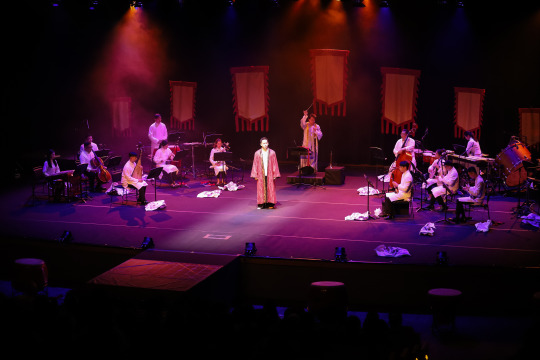
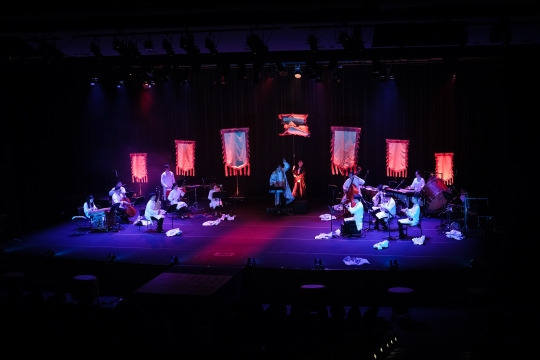
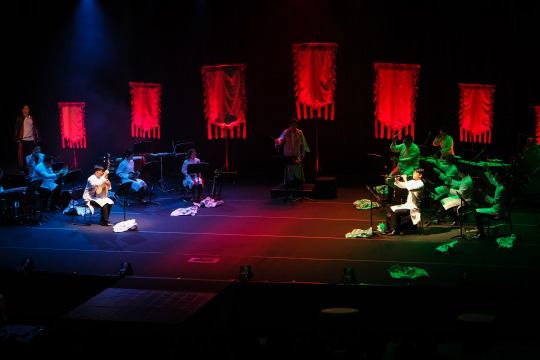

楚霸王 The Warlords by Ding Yi Music Company Singapore Chinese Cultural Centre October 2022 Instrumental Theatre Performance Director: Danny Yeo Playwright: Neo Hai Bin Composer: Edmund Song Performer: Timothy Wan Lighting Designer: Faith Liu Yong Huay
Recording of show: https://www.youtube.com/watch?v=MFnUTC1YT-0
Histories in the past has shown how humankind can become, when will we ever learn?
0 notes
Video
youtube
Ayn Rand libertarian back AGAIN for more insufferable nonsense
COMMENTARY:
This is typical of the ideological merry=go-round produced by the libertarian logic of Post Modern Historic Deconstruction and Ayn Rand's Objectivism and core value of the Virtue of Selfishness. You are always dealing with an unresolvable dialectic arising from employing half of a model.
In this case, as in the Virtue of Selfishness, the caller embrace Thomas Paine's "Rights of Man' as the essential personal component while abandoning Edmund Burke's social contract, In the case of Ayn Rand's Virtue of Selfishness, she mis-quotes the dictionary definition of "selfishness" as being "concern with one's self-interest" while irnoring the clause that completes the definition 'With out regard for others". This guy is doing basically the same thing
The fact is that the social contract is what sustains and guarantees individual rights. in a collaborative society, This clown can argue all he wants about the corrosive nature of social collaboration, but I've heard those same arguments from the anti-war draft dodgers of the 60s and the Christian Nationalists of the January 6 rebellion, It's all bull shit.
For me, it all comes down to flush toilets and indoor plumbing, The Free Market clowns of CPAC and Steve Bannon who promise to overthrow democracy have no more plan for how to sustain public utilities than Moscow Mitch and Trump has a viable replacement for Obamacare, This guy is basically from the same political persuasion as the neo-cons who thought invading iraq was a brilliant idea and then displayed cosmic incompetence in the administration of the occupation which lead to the creation of ISIS and the continued instability of the region,
If this guy is really determined to realize his Free Market fantasies, he should move to Haiti, where Free Market anarchy amount to a constant battle with predatory thugs, famine and disease, These people believe that you can mount a heroic Free Market struggle during the day, then stop off at the 7 Eleven on the way home to their Man Cave for a little workout on the Call of Duty video screen,
0 notes
Text
Art Theory and Criticism - Journal reflection 11
The origins and analysis of Romanticism
When analysing a specific movement and period, one must understand what influenced the artists of the movement from their previous masters of the time and style that came before them. Whether the new style was developed to reject a previous ideology, thus becoming a consequence of the era that came before or was simply adopted based on new discoveries and observations, it is certainly evident that the history of art evolves but always with references. A movement that has a deep history and origin is the Romanticism period. Aside from the movement spreading across all of Europe and later the United States, it did not only involve the visual arts, but also music, literature and even branches of philosophy (Wilder, 2021.)
The origins of the Romanticism movement boil down to the word ‘romantic’ varying from definitions of describing several intermingling languages spoken around Rome during the Classical period along with the associated fantastical stories of knights saving the damsel in distress princess from the dragon (Alliterative, 2016.) further analysing the origins of the Romantic period came the inspiration from the Grimm brothers gathering various German folk tales and huge Gothic architecture with pointed arches directing the eye up to the sky which indicated the heavens.
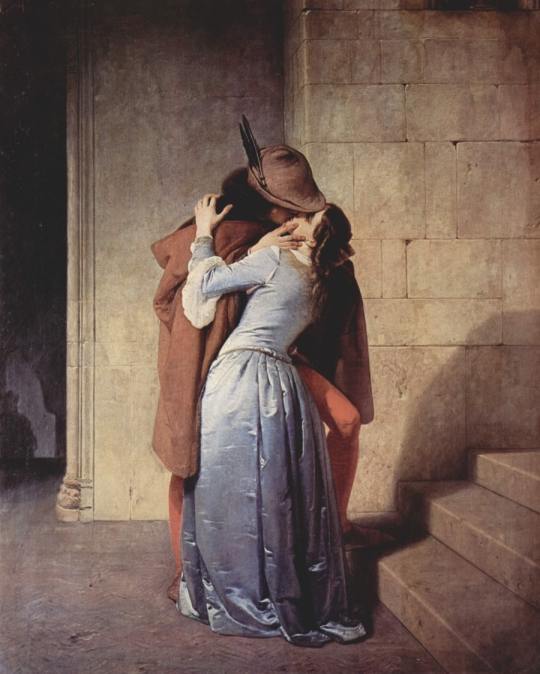
Figure 1: The Kiss, Francesco Hayez, c. 1859.
According to Alliterative (2016) inspiration from Edmund Burke’s 18th century treatise on aesthetics concerning Sublime represented in the visual arts and landscape painting, made for a breakthrough in rejecting the neo-classical period that came before Romanticism. This rejection stems from the Neo-classical period embracing logic and rationality, which the Romantics replaced with passion, expression, and the individual’s moral qualities. This sparked further reference to the sublime, fairy-tale folklore and fantastical elements of medieval stories that was present in the previous centuries.

Figure 2: John Constable, Salisbury Cathedral from the Meadows, exhibited 1831.
However, this knowledge came only to the privileged, as only the wealthy could realistically have time to think about these things and fantasise about them, while also delving into the literature, music and visual arts that broadened their horizons on the matter. Which is why it is very ironic that this class of people would sympathise with these famous stories of the period like Victor Hugo’s ‘The Hunchback of Notre Dame’, ‘Les Misérables’, and Mary Shelly’s ‘Frankenstein, as stated by Wilder (2021):
All three works are outcries against man's inhumanity to man. To drive home the point, the writers magnify the inhumanity so we can see it better. They do this by directing it against outcasts: a hunchback, an ex-convict, and a manmade monster. The more of an outsider someone is, the more people abuse that person.
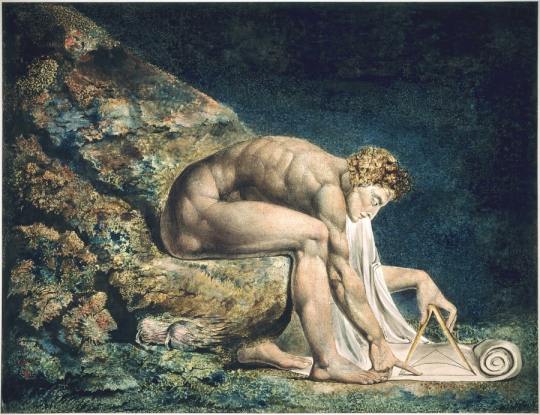
Figure 3: Newton, William Blake, c. 1804-1805.
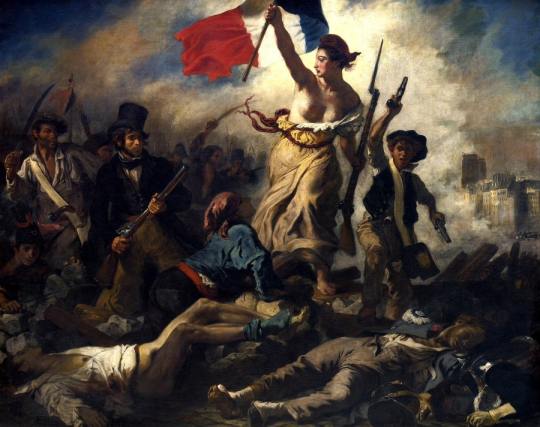
Figure 4: Liberty Leading the People, Eugène Delacroix, c. 1830.
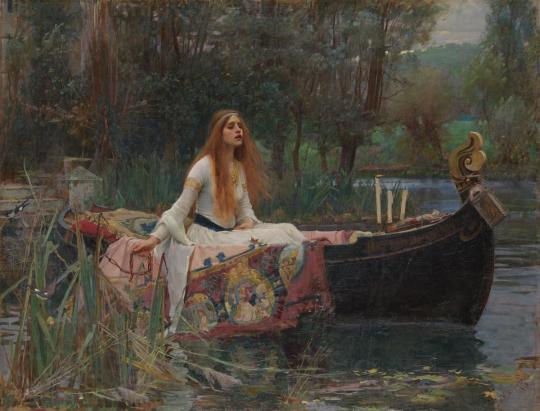
Figure 5: John William Waterhouse, The Lady of Shalott, 1888.
Overall, it was a positive movement that gave hope to its followers by encouraging the belief of one’s morals and the goodness of man that can be hidden under trauma, rejection, and disastrous events. Many of the revolutions and political crises that dragged along in struggle for decades was still fresh in these people’s minds. They wanted to enjoy the bright side of life along with appreciating nature’s sublime quality that reminded them of man’s insignificance of his fruitless struggles in war. In a way, this was their escapism from the darker times that still haunted them, along with humanity's dark side that creeps out in due time.
Reference list:
Alliterative, 2016. Sublime: The Aesthetics & Origins of Romanticism. YouTube. Available at: <https://www.youtube.com/watch?v=au-z2jVaTNk> [Accessed 7 January 2024].
Wilder, J.B., 2021. Defining Romanticism in the Arts. [online] dummies. Available at: <https://www.dummies.com/article/academics-the-arts/art-architecture/art-history/defining-romanticism-in-the-arts-200515/> [Accessed 7 January 2024].
1 note
·
View note